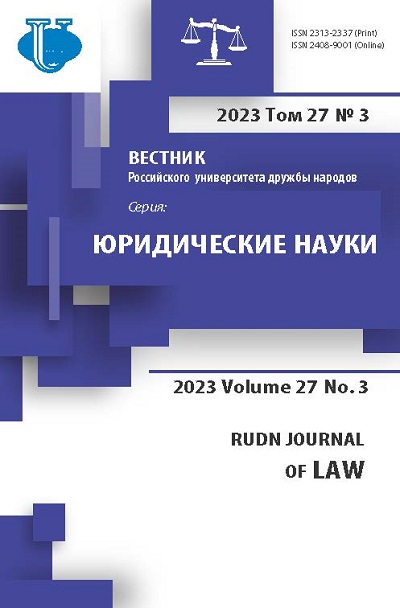Electronic Voting Technologies in Elections: Russian and Foreign Experience
- Authors: Gadzhieva A.O.1
-
Affiliations:
- Higher School of Economics (National Research University)
- Issue: Vol 27, No 3 (2023)
- Pages: 649-669
- Section: LAW AND DIGITAL TECHNOLOGIES
- URL: https://journals.rudn.ru/law/article/view/36136
- DOI: https://doi.org/10.22363/2313-2337-2023-27-3-649-669
- EDN: https://elibrary.ru/HRZNAS
- ID: 36136
Cite item
Abstract
The study explores the Russian and international experience of using such forms of electronic voting in elections as with the help of a special device (complex) for electronic voting at a polling station (in a voting room, or another specially defined place), and remote electronic voting through a personal computer or a mobile device. The article analyzes the circumstances and conditions that contribute to the development and consolidation of electronic voting in the country's legislation, or, conversely, the conditions that lead to suspension or even rejecting electronic technologies from the electoral process at the state level. Up-to-date information on the use of electronic technologies in the elections has been examined. The stages, problems, and difficulties of introducing electronic voting technologies in elections, as well as directions for further improvement of electronic voting in countries that have chosen the path of long-term development of digitalization of the electoral process are highlighted. In the early 2000s, many countries of the world gained experience in the practical use of electronic technologies in elections. However, the scientific and technological achievements so far did not provide the necessary degree of voters' confidence in the security of the electronic voting system or any reliable result. The prejudice towards electronic voting technologies, as well as high-cost modern electronic systems for implementation, persist in many countries to this day. This is an objective obstacle to the widespread use of electronic technologies in the electoral process. At the same time, the experience of remote electronic voting in Russia and Estonia, the fragmentary inclusion of electronic voting in electoral procedures in a number of other countries, and the widespread use of electronic voting complexes show that electronic technologies in elections are already a reality.
About the authors
Albina O. Gadzhieva
Higher School of Economics (National Research University)
Author for correspondence.
Email: agadzhieva@hse.ru
ORCID iD: 0000-0002-3971-4903
director of the Institute of National and Comparative Legal Studies, Deputy Dean of the Faculty of Law
20 Myasnitskaya str., Moscow, 101000, Russian FederationReferences
- Arefiev, V.I., Zhiltsov, V.A. & Chernyshovа, A.V. (2021) Analysis of the implementation of remote electronic voting by the Central Election Commission of the Russian Federation based on blockchain technology. Modern information technologies in education and scientific research (SITONI-2021): Proceedings of the VII International Scientific and Technical Conference, Donetsk, November 23, 2021. Donetsk, Donetsk National Technical University. pp. 276-281. (in Russian).
- Burmester, M. & Magkos, E. (2003) Towards secure and practical e-elections in the new era. In: Gritzalis, D.A. (ed.). Secure electronic voting. Advances in information security. (7). Springer, Boston, MA. pp. 63-76. https://doi.org/10.1007/978-1-4615-0239-5_5
- Chimarov, N.S. & Sergienko, A.M. (2021) Legal basis of remote electronic voting in the context of development of electronic democracy. Vestnik of Saint Petersburg Juridical Academy. 3(52), 23-26. (in Russian).
- Fedorov, V.I. (2019) Distant electronic voting and voter turnout: experience of Estonia and Moscow. Electoral legislation and practice. (4), 37-42. (in Russian).
- Hyde, S.D. (2008) How international election observers detect and deter fraud. In: Alvarez, R.M. Hall, T.E. & Hyde, S. (eds.). Election Fraud: Detecting and Deterring Electoral Manipulation. Washington, DC: Brookings Institution Press. pp. 27-35.
- Gadzhieva, A.O. (2022) Electronic voters list as a new element of digitalizing electoral process: legal and organizational basis. Law. Journal of the Higher School of Economics. 15(5), 44-65. https://doi.org/10.17323/2072-8166.2022.5.44.65 (in Russian).
- Golovin, A.G. (2021) On some aspects of the concept of power delegation by the people in the context of the development of technologies for remote electronic voting. Electoral legislation and practice. (2), 3-13. https://doi.org/10.18572/2500-0306-2021-2-3-13 (in Russian).
- Khudoley, D.M. & Khudoley, K.M. (2022) Electronic Voting in Russia and Abroad. Perm University Herald. Juridical Sciences. (57), 476-503. https://doi.org/10.17072/1995-4190-2022-57-476-503 (in Russian).
- Koshel, A.S. (2018) Developing the Formation Procedures for the State Duma of the Federal Assembly of the Russian Federation, as Well as Regional and Municipal Parliaments at the Current Stage. Tyumen State University Herald. Social, Economic, and Law Research. 4(1), 159-171. https://doi.org/10.21684/2411-7897-2018-4-1-159-171 (in Russian).
- Lopatin, A.I. (2022) Digitalization of electoral actions and procedures in russia: legal issues. Journal of Russian Law. 26(5), 43-55. https://doi.org/10.12737/jrl.2022.051 (in Russian).
- Madise, Ü. & Martens, T. (2006) E-voting in Estonia 2005. The first practice of country-wide binding internet voting in the world. Electronic Voting. 15-27. Available at: https://subs.emis.de/LNI/Proceedings/Proceedings86/GI-Proceedings-86-1.pdf [Accessed 03rd March 2023].
- Matveychev, M.Yu. (2019) Foreign experience of implementing of the electronic voting system as one of the most important mechanisms of electronic democracy. Law and state: the theory and practice. 8(176), 16-19. (in Russian).
- Mazurevskiy, K.S. (2022) Exercise of electoral rights: the modern trends. Constitutional and municipal law. (7), 42-47. https://doi.org/10.18572/1812-3767-2022-7-42-47 (in Russian).
- Mintusov, I.E. & Gulyaev, D.S. (2022) Remote electronic voting in the countries of the Anglo-Saxon system: USA, Australia, Great Britain. Why didn’t the dag vote catch on? Citizen. Elections. Authority. 1(23), 122-139. (in Russian).
- Petrova, S.V. & Sidorova, A.V. (2022) The system of remote electronic voting in the Russian Federation and ways to improve electronic democracy. State and Municipal Management. Scholar Notes. (1), 192-196. https://doi.org/10.22394/2079-1690-2022-1-1-192-196 (in Russian).
- Sivitsky, V. & Sorokin, M. (2016) Legal experiment and Development of Law. Law. Journal of the Higher School of Economics. (4), 15-30. https://doi.org/10.17323/2072-8166.2016.4.15.30 (in Russian).
- Oostveen, A. & Peter van den Besselaar (2003) E-voting technology is not neutral! In: Dittrich, K. et al. (eds.). Informatik 2003, Innovative Informatikanwendungen, Band 2. Lecture Notes in Informatics. pp. 218-221.
- Riera, A. et al. (2002). Internet voting: Embrating technology in electoral processes. In: Gronlund, A. (ed.). Electronic Government: Design, Application and Management. London, Idea Group Publishing. pp.78-98.
- Trechsel, A.H. (2007) Report for the Council of Europe Internet voting in the March 2007 Parliamentary Elections in Estonia. European University Institute, Florence, 31 July 2007. pp. 56-64.
Supplementary files















